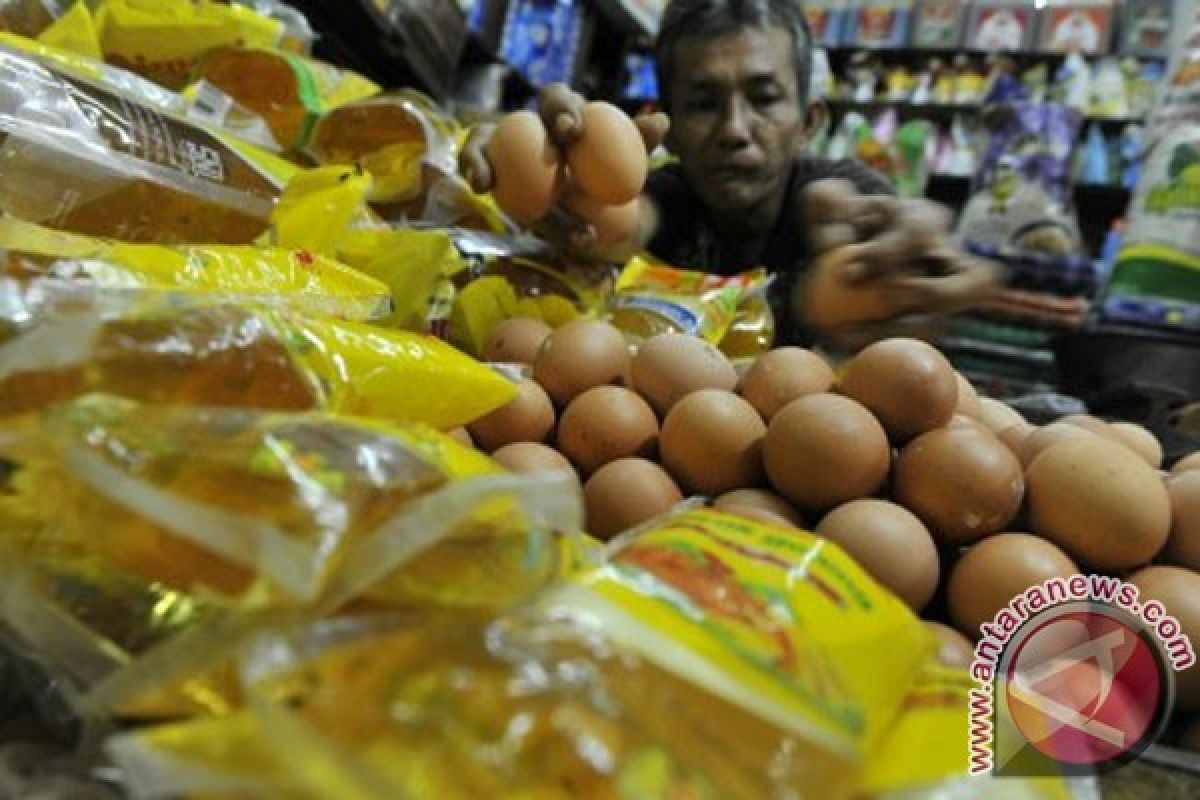Prices can hike and inflation can increase by about one percent during the Lebaran holidays."Jakarta (ANTARA News) - The government has checked food stocks and preparations for food distribution prior to Ramadan, the Muslim fasting month, which will begin at the end of June.
"The rice stock available with traders is about 20 thousand tons and that in the State Logistics Agency (Bulog) warehouses remain at 10 thousand tons. So, the stock remains secure," Chief Economic Minister Chairul Tanjung said, while checking rice stocks at the Cipinang wholesale rice market in East Jakarta on Friday.
Earlier on Wednesday (June 11), Deputy Trade Minister Bayu Krisnamurthi also conducted an inspection in a food distribution and retail center in Balaraja, Banten province, to ensure distribution of goods in the coming fasting month of Ramadan.
"We conducted the inspection to assure the availability of stocks. In yesterdays coordination meeting, we learned that food stocks and distribution were secure for the fasting month and the post-fasting Lebaran festivities. With these conditions, the public could solemnly conduct their fasting," Bayu Krisnamurthi said in a press statement on Wednesday.
Last month, Chief Economic Minister Chaerul Tanjung promised better food distribution than offered during last year's holiday.
"Food stocks and distribution of goods will be better this year than last year. So, we hope that there will be no serious problems with certain commodities during the next fasting month," the coordinating minister for economic affairs said.
The Central Bureau of Statistics (BPS) earlier warned that the government should make preparations for the publics food needs for the fasting month to ensure price hikes would not boost inflation.
"Prices can hike and inflation can increase by about one percent during the Lebaran holidays. So, the price of chicken and eggs, for example, should be maintained from now," Sasmito Hadi Wibowo, a deputy for service and goods statistics affairs of the BPS, said.
Also, Deputy Trade Minister Bayu Krisnamurthi made an inspection of the food retailer and distribution center in Balaraja to ensure stocks, distribution and price stability.
His inspection of the Balaraja retail center is a follow-up to the results of a meeting between the trade ministry and retailers from across the country.
Bayu said processed food consumption by low-income people in villages accounted for about 64 percent, while that of low-income urban people was recorded at 72 percent. Consumption of processed food was relatively high and retail shops played an important role in distributing processed food products.
"Therefore, we made the inspection to ensure the availability of food stocks for the publics basic needs and help maintain a controllable inflation rate," added Bayu.
He expressed hope that retail shops would provide more than enough basic needs and maintain stocks of 30 to 50 percent over normal supplies.
The deputy trade minister also advised that should prices be increased during the fasting month, it should be done gradually, based on the balance of stocks and demand for certain commodities.
One of the main food products is rice, which is a staple food for the Indonesian people. Thus, the coordinating minister for economic affairs inspected the availability of rice, both in the market and the warehouses of the state logistics board Bulog on Friday.
In his inspection to the Cipinang wholesale market in East Jakarta, Chairul Tanjung found the rice stock there would be adequate for Ramadan.
He said that the rice stock being held by traders reached about 20 thousand tons, while that in the Bulog warehouses remained at 10 thousand tons.
The normal transactions at the market were about two or three tons of rice per day, though some traders said the stock of IR3 rice needs to be replenished, he told newsmen during his visit to the Cipinang market.
"More supply is needed for cheap rice. I have asked Bulog to meet the required supply, which is expected to arrive this week," he added.
The chief economic minister also asked Bulog to increase rice supplies to the Cipinag rice wholesale market, although rice stocks in the market remain adequate. "Traders in the market asked for additional supplies of medium-class rice because they have enough stock of premium rice. I asked Bulog officials to supply the needed rice in the next one to two days, Chairul Tanjung said at a press conference in the Ministry of Trade office.
He said rice stock with traders at the Cipinang Market remained at about 20 thousand tons, while Bulogs stock in the same market was 10 thousand tons.
The minister also visited the Bulog warehouses in North Jakarta to monitor the availability of rice stocks there. "We also observed the availability of rice stocks in Bulog. There is about 76 thousand tons of rice in its warehouses, and that amount is more than enough, so the stability of rice prices can be maintained," he added.
Meanwhile, Bulog President Director Sutarto Alimoeso said his agency was ready to supply medium rice to the Cipinang market. "We are ready to supply rice, no matter how much is required, as we still have enough stock," he added.
Muhammadiyah, Indonesias second-largest Islamic organization after the Nahdlatul Ulama, had previously announced that the start of the fasting month of Ramadan would begin June 28.
In the run-up to the fasting month, the trade ministry will continue to observe wholesale and traditional markets in Jakarta and in other provinces to monitor prices, availability of stocks and distribution problems.
"The ministry of trade will also resume its annual agenda, such as holding bazaars in Jakarta on June 26 and July 22, 2014, and in provinces across the country on June 26 and July 22, 2014," noted Bayu Krisnamurthi.
Based on the monitoring by the Directorate General of the Ministry of Trade on June 10, 2014, the prices of several essential goods had, in general, remained stable. Only certain commodities saw price hikes, such as eggs, which increased by 2.14 percent, red unions 2.75 percent and the price of garlic was up 10.54 percent.
However, the prices of rice, wheat, imported soybeans, chickens and chili were relatively stable. The prices of sugar, cooking oil in bulk, local soybeans, beef and red chili declined by 0.15 percent to 6.85 percent.
Based on observations, the price of rice in the Cipinang market on Friday was still stable, ranging between Rp9,600 to Rp12,000 per kilogram for Cianjur Kepala, Cianjur Slyp, Sentra and Saigon rice types.
The price of medium rice declined by about 0.6 to 2.4 percent. The price of IR-64 I rice dropped 1.1 percent from Rp8,800 per kilogram to Rp8,700 per kilogram.
The price of IR 64 II also fell by 2.4 percent from Rp8,100 per kilogram to Rp7,900 per kilogram, while the IR 64 III fell by 1.3 percent from Rp7,500 per kilogram to Rp7,400 per kilogram.
(T.A014/INE/KR-BSR/O001)
Reporter: Andi Abdussalam
Editor: Priyambodo RH
Copyright © ANTARA 2014












